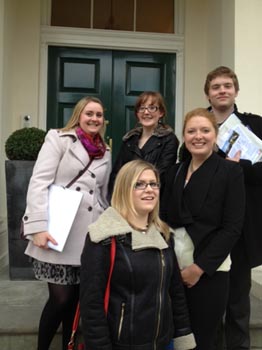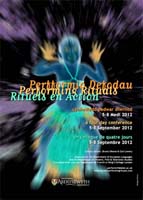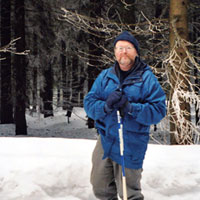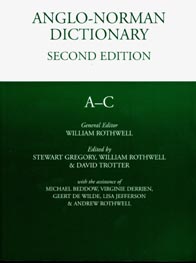2012
Seminar
03 September 2012
Dr Alex Mangold has been invited to teach a 2 day seminar on ‘Translations for Radio, Film and Theatre’ at the University Zittau/Görlitz in Germany from 14-15 May.
Congratulations
03 September 2012
Professor Trotter, D.A., has been invited to be member of comité scientifique of the Revue Internationale de Linguistique Française, published by the Institut de Linguistique Française.
Lectures
26 October 2012
Professor David Trotter is giving papers on
- ‘Tote manere d’oiseaus: les noms d’oiseaux en anglo-normand’, at Sco[nomin]alia 2, Strasbourg University, 18-19 October, and on
Major Grant awarded to the Anglo-Norman project
02 December 2012
In 2012, the AHRC awarded a further £802,412 to the AND project, bringing the total awarded to this project since 1996 from Research Council and other sources to £2,279,934 (or just: £2.28m) to enable revision of N-Q, and (through the appointment of a third research assistant to a two-year post), to implement a number of editorial changes: introduction of systematic cross-references to relevant dictionaries, and a complete overhaul of the usage labels in the Dictionary.
Romantic Hackers
06 December 2012
This co-authored paper – a collaboration between European Languages and English & Creative Writing – has been accepted for the annual international Hackers Congress 29C3 in Hamburg, Germany: ‘Not My Department’
Contemporary Cuban Cinema: New Spaces, New Histories
26 September 2012
Seminar series of the British Academy Link Programme UK-Latin America and the Caribbean: A joint project between the University of Havana and Aberystwyth University (Dr. Guy Baron).
The AND
29 November 2012
Anglo-Norman was the first language of Parliament. Spoken in England after the Norman Conquest, this variety of French has also provided us with a wide array of words that we now view as simply being part of the English language – including such linguistic gems as ‘lettuce’, ‘blubber’, ‘purchase’ and ‘mischief’. But we would be none the wiser about many of their origins had it not been for the Anglo-Norman Dictionary (AND).
Interdisciplinary European Languages and Cultures Seminar (IELCS)
04 December 2012
10 October Claudia Gremler (Aston) 'The Use of Video in MFL Teaching'
German Embassy
04 December 2012
On the 8th November 2012, nine other students and I travelled together from Aberystwyth to London to attend a careers fair organised by ‘Think German’.
Guest speaker
12 September 2012
On October 10 at 5, Dr Claudia Gremler from Aston University will give a talk/workshop on 'Use of video in MFL teaching'. This will be a generic session not focussing on only one language so will be useful for students who are thinking of doing a PGCE as well as those doing TEFL or going abroad as assistants.
Paper
11 September 2012
Dr. Wini Davies will be giving a paper on 'The pluricentricity of German: academic ideal or everyday reality' and co-organising a session on 'Microlinguistics and Language Planning' at the Sociolinguistics Symposium in Berlin.
Conference: Performing Rituals
14 September 2012
The Department of European Languages and the Department of Theatre, Film and Television Studies, Aberystwyth University, Wales, in connection with the French Department of King's College London, has organised a four day conference to explore the relationship between ritual and creativity.
L’anglo-normand à la campagne
04 December 2012
By Professor Trotter at the l’Académie des Inscriptions et Belles-Lettres during the 3rd session of the Anglo-Norman Studies cycle, 8 June 2012: Adaptation, parodie et autres emplois.
Lecture semantique
04 September 2012
L'École nationale des chartes accueillera M. David Trotter (université de Aberyswyth) comme professeur invité de la fin du mois de mars au milieu du mois d'avril.
Exibition and Talk
11 October 2012
This exibition features refugees from Austria who settled in the UK, among them the violinist Norbert Brainin, the photographer and cameraman Wolf Suschitzky, the dance teacher Stella Mann, and the composer Joseph Horowitz.
Kleiber Lecture
03 September 2012
At 1.10 on Wednesday 2nd May, in A14 Hugh Owen Building, Professor Georges Kleiber (Université de Strasbourg), will lecture on:
"Histoire de personne(s): Qui est JE? Qui est TU? Qui est IL?"
Professor Kleiber is one of the most distinguished French linguists of his generation.
Lecture Salzburg
14 September 2012
By Professor Hans GOEBL, University of Salzburg
'Introduction aux problèmes et méthodes de l’« Ecole dialectométrique de Salzbourg »' (avec des exemples gallo‐, italo‐ et ibéroromans) on Wednesday 29th February, 5.00 p.m., Hugh Owen A14.
Lecture: Consensus - The Parliament of Fools
14 September 2012
Professor David Wulstan will deliver a second lecture in the series "Research or re-search", on Consensus - the Parliament of Fools, on Wednesday 22nd February at 5 p.m. in Hugh Owen A14.
Kindertransportee Talk
14 September 2012
William Dieneman will recall his life story in a talk entitled ‘From Berlin to Aberystwyth: the life history of a former Kindertransportee’, Wednesday 14 March 2012 at 4pm in Hugh Owen A14
The Heretic
14 September 2012
The State Theatre in Oldenburg (Germany) is currently playing Dr Alex Mangold’s German translation of playwright Richard Bean’s latest play, The Heretic. The German title of the play is Ketzer more info
Lectures
Professor David Trotter is giving papers on
- ‘Tote manere d’oiseaus: les noms d’oiseaux en anglo-normand’, at Sco[nomin]alia 2, Strasbourg University, 18-19 October, and on

- ‘Rudde et mal aourné langage: les versions de La Fille du Comte de Pontieu’, at Transcrire et/ou traduire – Trascrizione/traduzione – Abschreiben oder Übersetzen? Variation et changement linguistique dans la tradition manuscrite des textes médiévaux, Klagenfurt, 15-16 Novembre 2012. >> For more details and programme follow the link Klagenfurt
Major Grant awarded to the Anglo-Norman project
In 2012, the AHRC awarded a further £802,412 to the AND project, bringing the total awarded to this project since 1996 from Research Council and other sources to £2,279,934 (or just: £2.28m) to enable revision of N-Q, and (through the appointment of a third research assistant to a two-year post), to implement a number of editorial changes: introduction of systematic cross-references to relevant dictionaries, and a complete overhaul of the usage labels in the Dictionary. In addition, from N onwards, the editors will be annotating entries with brief (or in a few cases, not so brief) comments about etymology and the rationale of the entry’s arrangement. As part of this next phase of the AND, Aberystwyth University is funding a Ph.D. studentship.
Romantic Hackers
Romantic Hackers: Keats, Wordsworth and Total Surveillance
Anne Marggraf-Turley and Professor Richard Marggraf Turley
This co-authored paper – a collaboration between European Languages and English & Creative Writing – has been accepted for the annual international Hackers Congress 29C3 in Hamburg, Germany: ‘Not My Department’
Combining literary and cultural interests from two departments, the paper explores the ideological framing of modern mass surveillance culture, and early forms of resistance, in Romantic England of the 1790s. We discuss the concept of analogue hacking as a precursor to contemporary forms. Topics of discussion include German privacy debates, international Cypherpunks and drones.
Live online streaming of all talks with IRC channel to take part in the discussions afterwards will be provided as well as recordings on a dedicated YouTube channel.
Anne Marggraf-Turley will also be part of The Interpretation Project at this 4-day congress.
_____________________________________________________________________________________________________
Contemporary Cuban Cinema: New Spaces, New Histories
Contemporary Cuban Cinema: New Spaces, New Histories
Seminar series of the British Academy Link Programme UK-Latin America and the Caribbean: A joint project between the University of Havana and Aberystwyth University (Dr. Guy Baron).
The project is aimed at achieving a greater understanding of the link between Cuban film and society post-1990. Many studies have been conducted that develop the understanding of Cuban film and society before 1990. These studies develop the link between the development of a revolutionary consciousness across Cuban arts and the attempt to deliver expressions of that consciousness through the medium of film.
Click HERE for the full-length (10 mins with subtitles) documentary on the UK-Latin America Link Programme that took place in Havana, Cuba, in April 2012. This short film is just one small result of the British Academy funded programme and the work of the delegation headed by Guy Baron and including Michael Chanan, Ann Marie Stock and Rob Stone.


More information and full programme
_____________________________________________________________________________________________________
The AND
Exploring the history of English
(by Anne Wollenberg, in the Arts & Humanities Research Council website)

Anglo-Norman was the first language of Parliament. Spoken in England after the Norman Conquest, this variety of French has also provided us with a wide array of words that we now view as simply being part of the English language – including such linguistic gems as ‘lettuce’, ‘blubber’, ‘purchase’ and ‘mischief’. But we would be none the wiser about many of their origins had it not been for the Anglo-Norman Dictionary (AND).
Professor David Trotter, head of the department of European Languages at Aberystwyth University, leads the Anglo-Norman Dictionary team. They are currently compiling the very much expanded second edition and, having recently completed the letter ‘M’, are now working on words that begin with ‘N’. The AHRC has been contributing to the project since 2001: funding awards have paid for editors and research assistance, as well as enabling the project team to digitise the AND. 
The dictionary is now available online without charge, so the team can update it more frequently and in much greater depth, and anyone who wants can access the resource for free. “It is endlessly correctible,” says Professor Trotter of the AND website, which allows the inclusion of any amount of relevant information, whereas the original printed edition required many resources to be cut down or omitted. “So, if someone searches through the English Historical Review and comes back with a page of new words for a letter we’ve already finished, we can go straight back and add them.”
Sources range from electronic documents to a vast number of paper slips inherited from Anglo-Norman scholar JP Collas, and new material is constantly being discovered. Professor Trotter cites a recent example of a text on the subject of astronomy: “I found words in it that I’m virtually certain we haven’t got such as artike (‘arctic’), aspekt (‘position’), pol ([north or south] ‘pole’). From a vocabulary perspective, some texts are more interesting than others. A text about preparing leather for making shoes would almost certainly contain more in a couple of pages than a few hundred pages of a routine chronicle.”
A lot of early French literature was written in England, “so there is an important section of what would normally be thought of as French literature which was actually composed or certainly copied in medieval England,” he notes. “However, I think its real importance is in the impact on the history of English.”
Take the word ‘lettuce’, for example. “The first edition of the Oxford English Dictionary didn’t have much to go on for ‘lettuce’,” says Philip Durkin, the OED’s principal etymologist. “The AND has given us firm evidence that the word was there in Anglo-Norman,” although it was more likely to be referred to as ‘laitue’ then.
The OED is also currently being revised and Durkin says it is hugely exciting to be able to incorporate updated information from the AND, as well as having access to the project team. “It is useful to have access not only to the information, but to the individual researchers,” he explains. “Having that interaction means we can ask questions about the data and whether they have more material that might help us.”
As well as being a highly useful academic resource, the AND is also a fascinating resource for any speaker of English, says Jocelyn Wogan-Browne, an English professor at Fordham University in New York who has used the resource for her own teaching and research in the area of medieval literature. “It is astonishing and fascinating for English speakers to realise how much French they actually speak in everyday life and the AND is invaluable for showing this. You can hardly scroll down any of its lists without coming across words we still use in our English, even if their spelling looks a little odd.”
Dictionaries contain provisional information or, as the OED’s Philip Durkin puts it, they provide a digest of everything that is currently known about a word. It only takes the discovery of one new document to turn a seemingly accurate entry into one that needs updating. In some cases, the AND has revealed new information that extends or contradicts entries in the Oxford English Dictionary.
For example, Professor Trotter’s team discovered new information about the word ‘blubber’ while debating how to classify a whale, which was incorrectly described as a fish in medieval literature. “We came across the word ‘blobbe’, which seems to be the first attestation of anything to do with blubber in English. It wasn’t thought to have appeared until the 15th century, but the Oak Book of Southampton, which deals with imports and exports, has a reference to it dating from around 1300.”
Determining the meaning of a word is problematic, however. “With modern languages you can verify meaning by asking other speakers, but we can’t do that and sometimes it’s genuinely difficult to work out what a word means,” says Professor Trotter. “This frequently involves some almost encyclopaedic digging and you become experts in all sorts of things for about a day and a half at a time.”
One area that has proved somewhat tricky is the classification of birds. “Literary texts often list lots of birds for effect. One text had a string of birds in a forest that seemed to include a duck and a puffin.” Abstract concepts such as feelings are also difficult to define, while some areas of activity, such as the exact methods of shipbuilding, simply aren’t documented at all.
While some dictionaries omit words if their meanings are undetermined, the AND contains plenty of incomplete entries because it is essentially a work-in-progress. “If a word exists in a dictionary, even with a question mark, a person who thinks they have seen the same word will be more likely to believe it is correct,” says Professor Trotter. “Otherwise, they will almost certainly change it, so you’re consistently correcting words out of existence.”
And there is still so much to find, says Daron Burrows, senior lecturer in medieval French language and literature at the University of Manchester and an AHRC peer reviewer. “It’s terrifying how little we know. The interaction between Anglo-Norman and English really hasn’t been thoroughly studied and you can find something new every day.”
For further information please go to: www.anglo-norman.net/
Image- A draft entry for the first edition of the Anglo-Norman Dictionary, in typescript and with handwritten corrections by Professor William Rothwell
Feature by Anne Wollenberg
Feature Description:
Date: 28/11/2012
Interdisciplinary European Languages and Cultures Seminar (IELCS)
- 10 October Claudia Gremler (Aston) 'The Use of Video in MFL Teaching'
- 28 November Sara Jones (Birmingham) 'Fragmented Autobiographies: The Archive and Memory in Testimonies of Stasi Oppression' (together with the Department of English and Creative Writing)
- 12 December tba.
- The Challenges of Research: Tea Time Seminars
- 17 October Alex Mangold: Lacan and Performance
News
On the 8th November 2012, nine other students and I travelled together from Aberystwyth to London to attend a careers fair organised by ‘Think German’. We arrived in London dressed very smartly and headed over to the German Embassy in the important diplomatic area called Belgrave Square where the event was being held at the German Ambassador’s residence.
Once we arrived we were able to talk to representatives from highly successful businesses and companies and we were informed about possible graduate employment opportunities, internships and placements. In attendance were representatives from: AGCS, Allianz Insurance plc, BMW UK, Carl Zeiss Ltd, Commerzbank AG, DB Schenker Rail Ltd, E.ON UK Plc, the European Commission Representation in the UK, Kaba Ltd, Robert Bosch Ltd. UK, Siemens plc, RWE npower and Zuhlke Engineering. A few of these companies also accepted CVs from us and asked us to fill in forms so that they could contact us with more information about possible opportunities within their company. It was a great chance for us to hear more about German companies and inspired us all to consider applying for jobs with them.
After our visit to the embassy, we were able to enjoy some time in London sightseeing and a few of us even travelled to one of Britain’s only German restaurants! We all had an amazing time and learned a lot and left feeling very inspired, and some, including myself, decided that pursuing a career using German in London would be brilliant. A trip that was definitely worth while!
Jessica Dixon
Guest speaker
On October 10 at 5, Dr Claudia Gremler from Aston University will give a talk/workshop on 'Use of video in MFL teaching'. This will be a generic session not focussing on only one language so will be useful for students who are thinking of doing a PGCE as well as those doing TEFL or going abroad as assistants.
Paper
Dr. Wini Davies will be giving a paper on 'The pluricentricity of German: academic ideal or everyday reality' and co-organising a session on 'Microlinguistics and Language Planning' at the Sociolinguistics Symposium in Berlin.
Conference: Performing Rituals
 The Department of European Languages and the Department of Theatre, Film and Television Studies, Aberystwyth University, Wales, in connection with the French Department of King's College London, has organised a four day conference to explore the relationship between ritual and creativity.
The Department of European Languages and the Department of Theatre, Film and Television Studies, Aberystwyth University, Wales, in connection with the French Department of King's College London, has organised a four day conference to explore the relationship between ritual and creativity.
Between 5-8 September 2012, international scholars and practitioners from an array of different disciplines, including anthropology, performance studies, sociology, comparative literature and film studies amongst others, will reflect on how ritual activity continues to structure and inform a number of key social, religious and artistic practices.
Seminar
Dr Alex Mangold has been invited to teach a 2 day seminar on ‘Translations for Radio, Film and Theatre’ at the University Zittau/Görlitz in Germany from 14-15 May. The seminar will focus on techniques and methods for translating dialogue from English into German and from German into English in all three of the above mentioned genres. More information
L’anglo-normand à la campagne
L’anglo-normand à la campagne
 By Professor Trotter at the l’Académie des Inscriptions et Belles-Lettres during the 3rd session of the Anglo-Norman Studies cycle, 8 June 2012: Adaptation, parodie et autres emplois.
By Professor Trotter at the l’Académie des Inscriptions et Belles-Lettres during the 3rd session of the Anglo-Norman Studies cycle, 8 June 2012: Adaptation, parodie et autres emplois.
Lecture
À travers vents et marées: la navigation et la sémantique
L'École nationale des chartes accueillera M. David Trotter (université de Aberyswyth) comme professeur invité de la fin du mois de mars au milieu du mois d'avril.
M. David Trotter donnera une conférence publique de sémantique historique, le mardi 10 avril à 17h, dans la grande salle, intitulée À travers vents et marées: la navigation et la sémantique.
Exibition and Talk
Double Exposure: Jewish Refugees from Austria in Britain
This exibition features refugees from Austria who settled in the UK, among them the violinist Norbert Brainin, the photographer and cameraman Wolf Suschitzky, the dance teacher Stella Mann, and the composer Joseph Horowitz. The exhibition (organised by Andrea Hammel and curated by Bea Lewkowicz) can be seen at the Aberystwyth Arts Centre Cafe Gallery from 11 February until 7 April 2012.
From Berlin to Aberystwyth: The Life and History of a Former Kindertransportee
Retired University Librarian William Dieneman will talk about his early life in Germany, his flight to the UK as part of the Kindertransport in 1939, and his education, career and later life in the UK.
Wednesday, 14 March 2012 at 4pm in Hugh Owen Building A14.
You can read more in this pdf: Hammel Do
Congratulations

Professor Trotter, D.A., has been invited to be member of comité scientifique of the Revue Internationale de Linguistique Française, published by the Institut de Linguistique Française.
Professor Trotter has also been elected to the Vice-Presidency of the Société de Linguistique Romane.
Prix Honoré Chavée

The Anglo-Norman Dictionary, directed by Professor D.A. Trotter since 2001, has been awarded the Prix Honoré Chavée of the Académie des Inscriptions et Belles-Lettres, founded in Paris in 1663. The PRIX Honorè CHAVÉE was established "to encourage linguistic studies and especially research relating to Romance languages”.
Lecture
At 1.10 on Wednesday 2nd May, in A14 Hugh Owen Building, Professor Georges Kleiber (Université de Strasbourg), will lecture on:
"Histoire de personne(s): Qui est JE? Qui est TU? Qui est IL?"
Professor Kleiber is one of the most distinguished French linguists of his generation.
Lecture
By Professor Hans GOEBL, University of Salzburg
'Introduction aux problèmes et méthodes de l’« Ecole dialectométrique de Salzbourg »' (avec des exemples gallo‐, italo‐ et ibéroromans) on Wednesday 29th February, 5.00 p.m., Hugh Owen A14.
Professor Goebl is the creator of the ALD : Atlant linguistich dl ladin dolomitich y di dialec vejins I + II / Atlante linguistico del ladino dolomitico e dei dialetti limitrofi I + II / Linguistic Atlas of Dolomitic Ladinian and neighbouring dialects
(Hugh Owen Library: ATLAS G1989.22.D6E3.G5 , ex dono auctoris) and founder of the pioneering “Salzburg school” of dialectometry (which has developed a methodology for the mathematical measurement of dialectal distance)
Lecture: Consensus - The Parliament of Fools
Professor David Wulstan will deliver a second lecture in the series "Research or re-search", on Consensus - the Parliament of Fools, on Wednesday 22nd February at 5 p.m. in Hugh Owen A14.
Professor Wulstan is a former Professor of Music in Aberystwyth, and Honorary Professor in the Department of European Languages.
All welcome.
Talk and Event
William Dieneman will recall his life story in a talk entitled ‘From Berlin to Aberystwyth: the life history of a former Kindertransportee’, Wednesday 14 March 2012 at 4pm in Hugh Owen A14
Special viewing at 5.30 of an exhibition in the Cafe Gallery of the Aberystwyth Arts Centre. The exhibition is entitled ‘Double Exposure: Jewish Refugees from Austria in Britain’ which will be on show from 11 February to 7 April 2012.
Lectures
Dr. Wini Davies
- Will be giving a paper on ‘German at Grammar Schools in Germany, Luxembourg and German-speaking Switzerland: A Comparison’ at the Forum for Germanic Language Studies, Sheffield, January 6-7, 2012. More information and Programme
- Will be a guest speaker at the summer school on ‘New Methods in Dialectology’, Kiel, August 2012.
Play and Paper
The State Theatre in Oldenburg (Germany) is currently playing Dr Alex Mangold’s German translation of playwright Richard Bean’s latest play, The Heretic. The German title of the play is Ketzer more info
Dr. Alex Mangold has been invited to present his paper ‘Sarah Kane and the Idea of the New Tragic’ at next year’s Sarah Kane Festival at the University of Lincoln. The festival will run from 26-30 March 2012.
Department of Modern Languages, Aberystwyth University, Hugh Owen Building, Penglais, Aberystwyth, Ceredigion, SY23 3DY
Tel: Department: +44 (0)1970 622552 Admissions: +44 (0)1970 622021 Email: modernlangs@aber.ac.uk
